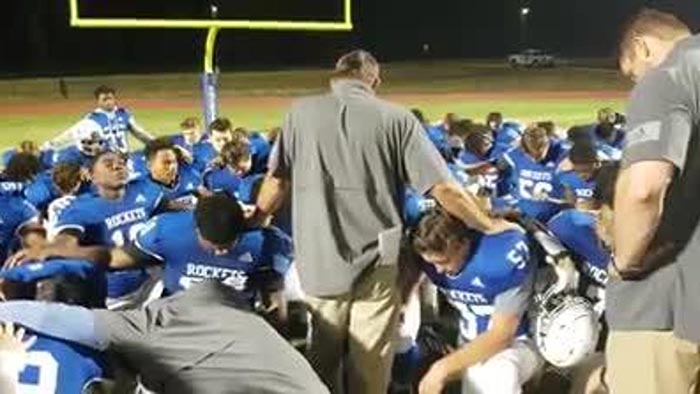
From K-12 Dive
By Naaz Modan
April 11, 2022
Later this month, the U.S. Supreme Court will hear oral arguments in Kennedy v. Bremerton School District, a First Amendment case on the constitutionality of a Texas football coach’s decision to pray following football games.
The case could have implications for how districts nationwide manage staff.
“I think from the school district perspective, it’s not good that the court granted cert [certiorari, or review], because they prevailed in the lower courts,” said John Borkowski, a partner at law firm Husch Blackwell, which represents clients in education and other sectors. “And I think they’d have very important issues at stake in the case in terms of their ability to have managerial control over their employees and protect the rights of all of their students.”
Here’s what you need to know before arguments are heard April 25:
Coach prayed with and without students
A major question that has surfaced about the case is whether the coach, Joseph Kennedy, involved students in his routine post-game prayers. According to the petition, Kennedy initially prayed “quietly and alone.”
“After several games, some BHS [Bremerton High School] players asked him what he was doing and whether they could join him,” the petition says, adding that some players ultimately elected to gather near Kennedy after the games, and the number “ultimately grew to include most of the team, although the participants often varied.”
Photographs included in court documents confirm Kennedy and students kneeling with their heads bowed in a circle.
While the petitioner in this case — Kennedy — says students chose to join, the respondent in the case — the school district — argues some instances were coercive.
“We’re saying that when you’re a student … you know that what you need to do, is to do what the coach thinks is important and shows you is important,” said Richard Katskee, lead attorney representing Bremerton School District, on a press call. “And that is coercive. That is pressure on the students, and we’re saying that that is what happened.”
The district said it also heard from parents who reported their children felt “compelled to participate,” according to court documents filed by the district.
The district will fall back on two major arguments
Bremerton School District will rely on the 2006 case Garcetti v. Ceballos, in which the Supreme Court decided that speech by a public official is only protected by the First Amendment if it is engaged in as a private citizen and not as part of the employee’s public duties.
“The district is paying somebody to speak and convey its message. That’s how schools work,” said Katskee. “They give him [Kennedy] the charge of the students at the football game in the center of the field, and he’s supposed to be giving motivational speeches as coaches do. He instead for many years was delivering prayers to the students.”
The district will also argue that, regardless of whether Kennedy’s speech was private or public, it eventually resulted in a protest the district has a right to control. “Private speech by school employees can be subject to control if it causes problems, [if it] interferes with … the message it [the school district] wants to send,” Katskee said, referring to an incident where students allegedly stormed the field in response to the situation.
Kennedy’s lawyers argue in their petition that many citizens do much of their talking inside their respective workplaces, so it would violate Kennedy’s rights “to hold that all speech within the office is automatically exposed to restriction.”
They also argue Kennedy’s prayer was outside of his duties as a school district employee.
“The ‘critical question’ in determining whether a public employee spoke as a citizen is whether the ‘speech at issue is itself ordinarily within the scope of an employee’s duties,’” the petitioners argue, citing Lane v. Franks as precedent.
In that 2014 decision, the Supreme Court found that citizen speech made by a public employee on a public matter does not automatically place that speech under the public employee’s responsibilities.
“Coach Kennedy’s brief, personal acts of religious expression plainly were not undertaken as part of his job responsibilities as an assistant football coach,” his lawyers argue.
Nearly half of state attorneys general filed in support of Kennedy
Some familiar with the case question its implications for recent and nationwide debates around what teachers can and cannot discuss in the classroom.
Of the 24 states that jointly filed an amicus brief in favor of Kennedy, for example, a handful are also states that have passed bans on teaching critical-race theory or restricting classroom discussion around LGBTQ topics.
Katskee called those states’ decisions to file an amicus brief “surprising.”
“And the fight in many of those same states is to limit what school districts teach or what teachers teach,” Katskee said.
States that filed in favor of Kennedy’s speech but also have legislation censoring what teachers can discuss in the classroom include Florida, Georgia, Idaho, Texas, Oklahoma and West Virginia.
The decision could cause districts to reconsider policies
Considering the conservative-majority bench, it is possible the justices will decide in favor of Kennedy and expand the First Amendment’s Free Exercise clause, which protects citizens’ right to practice religion as long as it does not violate “public morals” or a “compelling government interest.”
This case “gives that conservative majority on the court the opportunity to go further in that direction,” said Borkowski.
If the decision does swing in that direction, districts will have to “recalibrate their policies around regulation of employees’ speech” in a way that balances the interest of both students and teachers, he added.
“I think it would invite more employees to test the limits of where they could be engaged in their own personal religious expression around students.”
Photo: Daily News Journal
Read this and other stories at K-12 Dive

